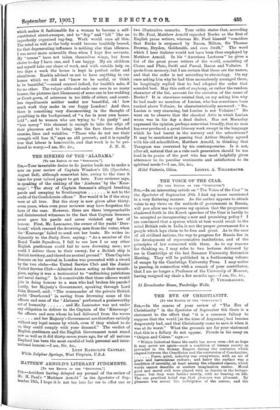MATTHEW ARNOLD'S LITERARY JUDGMENTS. [To THE EDITOR Or TEE "SPECTATOLI
Sin,—Accident having delayed my perusal of the review of Mr. H. Paul's " Matthew Arnold " in the Spectator of Sep- tember 13th, I hope it is not too late for me to offer one or
two illustrative remarks. Your critic states that, according to Mr. Paul, Matthew Arnold regarded Burke as the first of English prose writers, whereas Mr. Paul himself "considers that Burke is surpassed by Bacon, Milton, Sir Thomas Browne, Dryden, Goldsmith, and even Swift." The word which I here italicise would not have been thus employed by Matthew Arnold. In his " American Lectures " he gives a list of the great prose writers of the world, consisting of Cicero and Plato, Swift and Pascal, Bacon and Voltaire. I quote from memory, but I am certain that these are the names, and that the order is not according to chronology. On my once asking him why he had thus anomalously arranged them, he laughingly replied that he had adopted the order that sounded best. May this cult of euphony, or rather the random character of the list, account for the omission of the name of Burke P It is elsewhere related that, on my asking him why he had made no mention of Lucian, who has sometimes been ranked above Voltaire, be characteristically answered " No. Lucian is very charming, but Lucian is not Voltaire !" He went on to observe that the classical Attic in which Lucian wrote was in his day a dead dialect. Has not Macaulay expressed the opinion, perhaps somewhat broadly, that no man has ever produced a great literary work except in the language which he had learnt in the nursery and the schoolroom P It may be mentioned in passing that Arthur Stanley agreed with his old schoolfellow, Matthew Arnold, in thinking that Tennyson was overrated by his contemporaries. Is it not, after all, natural that as a rule each generation should be too loud in its praise of the poet who has most helpfully given utterance to its peculiar sentiments and satisfaction to ite spiritual needs P—I am, Sir, &c.,










































 Previous page
Previous page